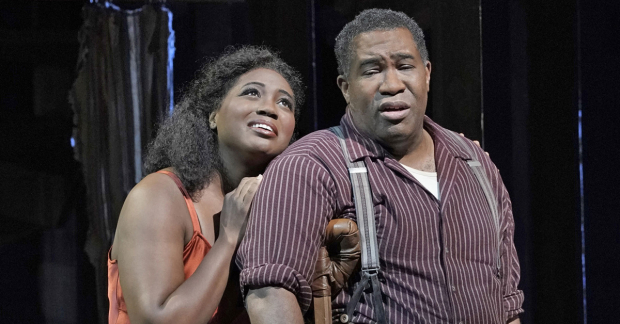Opera Star Angel Blue on Singing Porgy and Bess and Sharing Its Relevance
This Friday, July 17, PBS's Great Performances will present the Metropolitan Opera's 2019 production of George and Ira Gershwin and DuBose and Dorothy Heyward's Porgy and Bess. Directed by James Robinson and choreographed by Camille A. Brown, the staging features opera stars Eric Owens and Angel Blue in the title roles. Here, Blue reflects on singing the role of Bess and tells about the show's unending relevance, especially right now.

(© Ken Howard)
Tell me about your career journey with Porgy and Bess. What is your relationship to the show?
I first did scenes from Porgy and Bess in high school as a chorister, and I really enjoyed it. My introduction to it as a professional, though, was when I sang the role of Clara at San Francisco Opera when I was 25. I sang Bess in a concert in 2017 with the Philadelphia Orchestra, and then I sang the entire role in 2018 with the Seattle Opera. The Metropolitan Opera in 2019 was my second full production, but my third time singing Bess's music.
The show didn't really settle with me until 2017. I don't think I understood all the aspects of what Porgy and Bess is until then. You know how people say Porgy and Bess is the great American opera? Well, it really is.
What does the show mean to you?
What Porgy and Bess truly represents to me is hope. Out of everything I've sung, Tosca, La Traviata, La Bohème, this is the one opera where you really get a sense that every single person, from Bess, with her addiction and insecurity problems, to the drug dealer Sportin' Life, is striving for a better life, not just for them, but for their family and community. And it's such a universal story. It's about Black people in the South, but you can put any group of people into those characters and the story would resonate with whoever's watching it.
What was harder, singing Bess's music or acting the role?
I wouldn't say that the music is difficult, but the acting was the hard part for me, trying to portray her and have integrity while portraying her. I guess maybe I'm addicted to coffee, but I don't really have an addiction. Bess is very addicted to sex, cocaine; she has a really difficult time. She's fighting with herself in trying to be better, but she's just so used to being this woman who is abused and torn apart.
I love our director, James Robinson. I love when I work with directors who care about the characters. He had a backstory for every single person in Catfish Row. It had nothing to do with the singing. It was pure theater. That was the cool part of it.
When I first sang Bess three years ago, I looked at her as Shug Avery from The Color Purple. She's this sexy woman, she goes out with men. When I did the role in 2018, I read the novel Porgy, and then I reread it when I was working with James, and there were things he pointed out that he felt were essential to who Bess is as a person. He was able to pull that out of me because he allowed me the freedom to try many different ways to portray this character. When you have a director who wants you to engage with your character, that's amazing.
When I saw the production live in January, the sections with the police, the only white characters in the show, were very frank and disturbing. The piece seems even more relevant now in light of George Floyd's murder and the ongoing protests. Can you talk about putting those sections of the show together, and it's overall relevance now?
I never really interacted with the police in the show, other than running away from them in the funeral scene. Off-stage, I came in one day with candies and I was giving them out to everyone. I was talking to the guys who play the police, and the guys who get arrested by the police, and James is like, "Let's get started again," and we're immediately back into that zone of the racist, segregated South. That was weird! But it's part of what we do. It's part of the acting.
I'm happy that the Met has chosen this piece, because it is relevant to today. It's important for people to know our history and the history in the United States of racism. It's only within the last 50 to 60 years that segregation was ended. My mom would tell me stories of when she went down South to see her mother's family, and how she'd see signs that say "For coloreds only." That's part of our history, and it seems as though right now, people are willing to talk about those things and come up with ways to understand each other so we're not stuck in our past.
I do think Porgy and Bess helps us pull ourselves out of where we used to be, and I hope that it's something that continues to happen. We need to realize that we need to treat each other the way they want to be treated. That is ultimately what Porgy and Bess is about: Do unto others as you would have them do unto you. It is an important thing for us to talk about, so we don't go back to our past.










